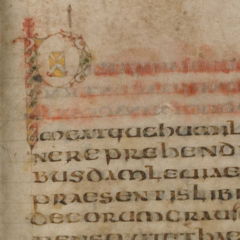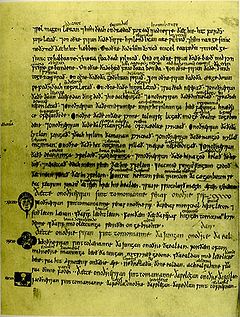
Pastoral Care
Encyclopedia

- For the general phrase concerning responsibilities of the clergy, see Pastoral carePastoral carePastoral care is the ministry of care and counseling provided by pastors, chaplains and other religious leaders to members of their church or congregation, or to persons of all faiths and none within institutional settings. This can range anywhere from home visitation to formal counseling provided...
.
Liber Regulae Pastoralis or Regula Pastoralis (The Book of the Pastoral Rule, commonly known in English as "Pastoral Care", a translation of the alternative Latin
Latin
Latin is an Italic language originally spoken in Latium and Ancient Rome. It, along with most European languages, is a descendant of the ancient Proto-Indo-European language. Although it is considered a dead language, a number of scholars and members of the Christian clergy speak it fluently, and...
title Cura Pastoralis) is a treatise on the responsibilities of the clergy
Clergy
Clergy is the generic term used to describe the formal religious leadership within a given religion. A clergyman, churchman or cleric is a member of the clergy, especially one who is a priest, preacher, pastor, or other religious professional....
written by Pope Gregory I
Pope Gregory I
Pope Gregory I , better known in English as Gregory the Great, was pope from 3 September 590 until his death...
around the year 590, shortly after his papal
Pope
The Pope is the Bishop of Rome, a position that makes him the leader of the worldwide Catholic Church . In the Catholic Church, the Pope is regarded as the successor of Saint Peter, the Apostle...
inauguration. It became one of the most influential works on the topic ever written. The title was that used by Gregory when sending a copy to his friend Leander of Seville
Leander of Seville
Saint Leander of Seville , brother of the encyclopedist St. Isidore of Seville, was the Catholic Bishop of Seville who was instrumental in effecting the conversion to Catholicism of the Visigothic kings Hermengild and Reccared of Hispania .-Family:Leander and Isidore and...
. The text was addressed to John, the Exarch of Ravenna, as a response to a query from him. Gregory later revised the text somewhat.
The personal, intellectual and moral standards Gregory enjoined did not at all points closely reflect 6th century realities: for example, one letter from the Bishop of Cartagena (Book II, letter 54 in Gregory's collected correspondence) praises the book, but expresses a reserve that it might prove beyond ordinary capacities.
The influence of the book, however, was vast. After reading the Regulae, the Byzantine emperor Maurice directed that it be translated and distributed to every bishop within the empire (Demacopoulos). Indeed, among the works of all the Latin authors in the patristic period, Gregory's alone were translated into Greek during his own lifetime.
In the West, the book also retained its significance and broad dissemination.
That the book had been taken to England by Augustine of Canterbury
Augustine of Canterbury
Augustine of Canterbury was a Benedictine monk who became the first Archbishop of Canterbury in the year 597...
— who was sent to the Kingdom of Kent
Kingdom of Kent
The Kingdom of Kent was a Jutish colony and later independent kingdom in what is now south east England. It was founded at an unknown date in the 5th century by Jutes, members of a Germanic people from continental Europe, some of whom settled in Britain after the withdrawal of the Romans...
by Gregory in 597— was noted in the preface to it written by Alfred the Great
Alfred the Great
Alfred the Great was King of Wessex from 871 to 899.Alfred is noted for his defence of the Anglo-Saxon kingdoms of southern England against the Vikings, becoming the only English monarch still to be accorded the epithet "the Great". Alfred was the first King of the West Saxons to style himself...
, who in the late 9th century translated it into Old English as part of a project to improve education in Anglo-Saxon England
Anglo-Saxons
Anglo-Saxon is a term used by historians to designate the Germanic tribes who invaded and settled the south and east of Great Britain beginning in the early 5th century AD, and the period from their creation of the English nation to the Norman conquest. The Anglo-Saxon Era denotes the period of...
. In addition to details of his translation methodology, the extensive preface describes the rationale and intentions behind the project: even hundreds of years after it was written, the work was still seen as the most essential guide for pastor
Pastor
The word pastor usually refers to an ordained leader of a Christian congregation. When used as an ecclesiastical styling or title, this role may be abbreviated to "Pr." or often "Ps"....
s, and Alfred wished every bishop in his kingdom to have a copy for the benefit of the less-educated clergy.
Alfred the Great
Alfred the Great
Alfred the Great was King of Wessex from 871 to 899.Alfred is noted for his defence of the Anglo-Saxon kingdoms of southern England against the Vikings, becoming the only English monarch still to be accorded the epithet "the Great". Alfred was the first King of the West Saxons to style himself...
's translation is kept at the Bodleian Library, Oxford, and is the oldest known book written in English. In May 2011, it was inscribed in UNESCO
UNESCO
The United Nations Educational, Scientific and Cultural Organization is a specialized agency of the United Nations...
's UK Memory of the World Register
UK Memory of the World Register
The UK Memory of the World Register, on which work started in 2009 and whose first inscriptions were made in 2010, is a list of individual documents and documentary collections of particular importance to the United Kingdom; it is the national complement to UNESCO's international Memory of the...
.

Charlemagne
Charlemagne was King of the Franks from 768 and Emperor of the Romans from 800 to his death in 814. He expanded the Frankish kingdom into an empire that incorporated much of Western and Central Europe. During his reign, he conquered Italy and was crowned by Pope Leo III on 25 December 800...
's bishops at a series of councils held in 813, and a letter of Hincmar, Archbishop of Rheims 845–882, notes that a copy of it, together with the Book of Canons, was given into the hands of bishops before the altar at their consecration (Schaff).
Among the numerous manuscripts of these widely-read Regulae, perhaps the oldest is Troyes, Bibliothèque Municipale, MS 504; it is an early seventh-century manuscript in an uncial
Uncial
Uncial is a majuscule script commonly used from the 3rd to 8th centuries AD by Latin and Greek scribes. Uncial letters are written in either Greek, Latin, or Gothic.-Development:...
script without divisions between words, probably originating in Rome. There are about twenty-five long lines per page. The only ornamentation in the manuscript consists of penwork initials in red, green and yellow (above). It contains the full revised text, and is one of the oldest complete books known.

